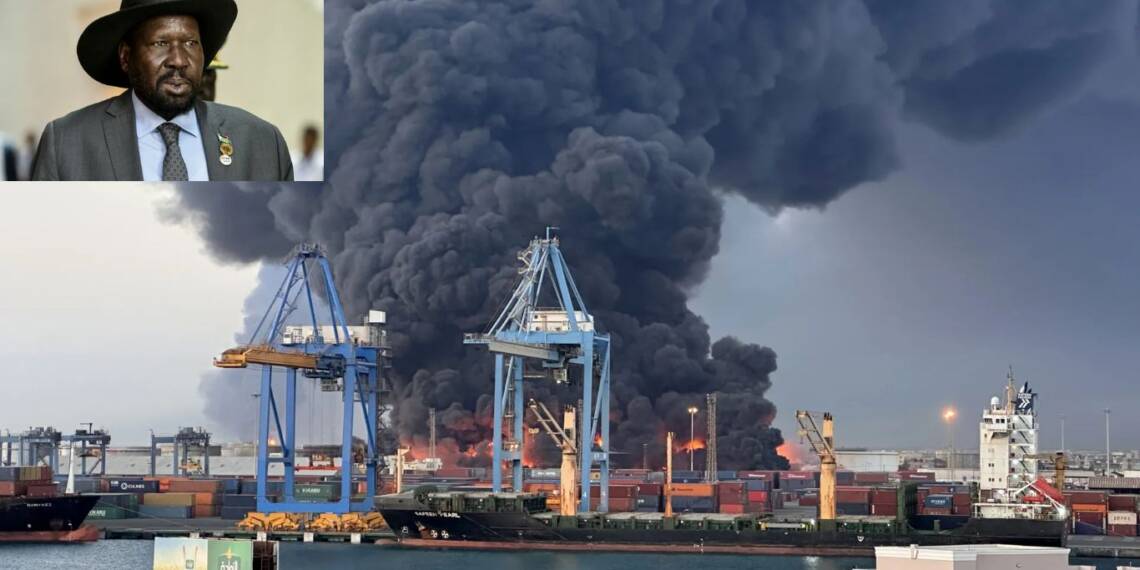South Sudan, a landlocked and impoverished country, is on the brink of economic collapse after Sudan’s army-backed government warned it could soon shut down the oil export route that South Sudan relies on entirely. Over 90 percent of South Sudan’s government revenue comes from oil, all of which is exported through Sudan’s Port Sudan on the Red Sea.
Drone Attacks Disrupt Key Infrastructure
This alarming development came after a series of drone attacks, reportedly carried out by the paramilitary Rapid Support Forces (RSF), targeted key infrastructure in Port Sudan, including a fuel depot and electricity grids. These attacks, carried out for six consecutive days, have shaken the already fragile region. In response, Sudan’s energy and petroleum ministry sent a letter to its South Sudanese counterpart on May 9, stating that the risk of halting export operations is now “very high.”
Experts believe that if the pipeline is shut down, South Sudan’s already fragile economy could collapse and potentially pull it into Sudan’s brutal civil war between the army and the RSF. The RSF and Sudanese army have been at war since April 2023, a conflict that has killed tens of thousands, displaced over 13 million people, and destabilized the wider East African region.
Sudan claims that the drone attacks have severely damaged its ability to export South Sudan’s oil. While Sudan’s army says the shutdown is due to security risks, some experts suspect that Khartoum may also be pressuring South Sudan to pay higher transit fees. Sudan currently collects fees from Juba (South Sudan’s capital) for using its pipeline and port, a deal dating back to the 2005 peace agreement that ended decades of north-south civil war and led to South Sudan’s independence in 2011.
South Sudan’s oil exports had only resumed in January 2025 after nearly a year of suspension caused by previous pipeline damage during clashes. The current crude oil flow is estimated at about 110,000 barrels per day.
Beyond the financial arrangements, there are deep political and military tensions involved. According to the International Crisis Group, South Sudan has been paying off the RSF to avoid attacks on oil pipelines that pass-through areas under RSF control. Additionally, the RSF has reportedly increased its presence along the Sudan-South Sudan border, with support from the Sudan People’s Liberation Movement-North (SPLM-N), a group historically close to Juba and hostile to Sudan’s army.
Internal Fragility in Juba
This alliance has made Sudan’s military suspicious of South Sudan, accusing it of helping the RSF both politically and militarily. Edmund Yakani, a civil society leader in South Sudan, noted that the army suspects Juba of giving the RSF freedom to operate along the border, frustrating the Sudanese leadership.
The situation is further complicated by South Sudan’s own political instability. President Salva Kiir leads a weak coalition government, largely held together by oil money used to pay off elites and fund the bloated security sector. A 2021 report from the International Crisis Group revealed that 60 percent of oil profits go to multinational oil companies, while most of the remaining 40 percent is used to repay loans and pay government officials.
Without a steady flow of oil revenue, Kiir may struggle to maintain control, especially amid tensions with his rival, Vice President Riek Machar. In fact, earlier this year, South Sudan’s Oil Minister Puot Kang Chol — an ally of Machar — was arrested, raising concerns that the fragile peace agreement between Kiir and Machar may be falling apart.
Despite the urgency, South Sudanese officials have not commented on whether they have a contingency plan if oil exports stop again. When exports were halted last year, the impact on the country’s economy was devastating.
Now, with drone strikes threatening critical infrastructure and rising tensions between Sudan and South Sudan, experts fear the oil shutdown may be inevitable — and with it, a deeper crisis for one of the world’s youngest and most vulnerable nations.








